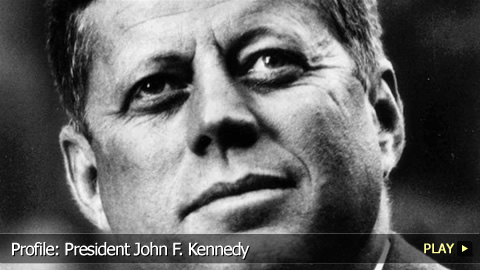John F. Kennedy Biography - Life and Death of a President

The Life of JFK
Charismatic, charming and captivating are just some of the words often used to describe John F. Kennedy, the 35th President of the United States.
Born in May of 1917, JFK, as he would often be referred to later on, suffered from numerous medical bouts throughout his young adulthood.
But when he graduated university at the Choate School in Connecticut in June of 1935, his yearbook tagline read: “Most likely to become President”
In 1941, Kennedy entered the US Navy and participated in various missions, including those in the South Pacific, earning the rank of Lieutenant as the commander of the Motor Torpedo Boat PT-109. He won several medals for his military service, including: the Navy and Marine Corps Medal, the Purple Heart, the Asiatic-Pacific Campaign Medal, and the World War II Victory Medal.
When he returned, he considered becoming a journalist but instead opted for politics. His father Joseph encouraged him and prepared him as he represented the 11th congressional district of Massachusetts’ in the House of Representatives from 1947 to 1953 and later in the US Senate from 1953 to 1960.
It was in 1952 that JFK met Jacqueline Lee Bouvier and their marriage would become a thing of fairytales one year later, becoming known as “the House of Camelot”.
In January 1960, Kennedy announced his intention of running for President against Republican Richard Nixon. In September of the same year, Kennedy and Nixon appeared in the 1st televised Presidential debate in US history. They became a milestone because the medium of television was now going to play a major role in national politics. For those who viewed the debates on TV, they saw Nixon looking tense and uncomfortable while Kennedy appeared much more relaxed, leading audiences to believe Kennedy came out on top.
And in November, Kennedy beat Nixon in a very close election, winning 303 votes to Nixon’s 219 (you need 269 to win).
One of Kennedy’s most famous speeches came at his inaugural address where he said, “Ask not what your country can do for you; ask what you can do for your country.”
During his short tenure, Kennedy dealt with numerous events. One such event was that of the Bay of Pigs.
Before Kennedy entered office, there was a plan in place to overthrow Fidel Castro in Cuba. The idea was that the US would train Cuban insurgents who would then invade Cuba and set off an uprising among the Cubans, hoping it would lead to Castro’s demise. Kennedy okay’d the plan to go ahead and on April 17, 1961, 1500 US-trained Cuban exiles entered Cuba, however, a mere 2 days later on April 19th, the Cuban government had either killed or arrested the insurgents and Kennedy was forced to negotiate the release of 1189 survivors.
Another event JFK had to deal with was the Cuban Missile Crisis in October of 1962. A CIA spy plane photographed an intermediate-range Soviet missile site which was under construction in Cuba. Kennedy started negotiations with the Soviets and ordered them to remove all material that was being built in Cuba. If the orders were not followed, both the Soviets and Cubans would be facing a naval quarantine. One week later, Kennedy and the Soviet Premiere Khrushchev agreed to remove the missiles subject to UN inspections on the condition that the US promise to never invade Cuba and to remove US missiles in Turkey.
JFK was also instrumental in the space program.
He approached Khrushchev on 2 separate occasions in regards to a joint venture for space exploration. The 1st time around, in June 1961, the Soviets were further ahead than the US. The 2nd time the subject was broached in the Fall of 1963, Khrushchev felt the venture would be beneficial and Kennedy asked Congress to approve $25 billion for the Apollo Project. However, before the agreement could be finalized, Kennedy was assassinated. Six years later, the Apollo Project came to fruition when the first man landed on the moon on July 20, 1969.
On November 22nd, 1963, during a motorcade procession, President Kennedy was shot in the upper back and in the head during a trip to Texas and subsequently died. Lee Harvey Oswald was arrested and charged in the assassination of the President (though there are many conspiracy theories behind this).
Three days later, the youngest President to die, was buried in Arlington National Cemetery. Five years later, his brother Robert was also assassinated and would be buried next to him. Later on, Jacqueline Kennedy was buried next to him and most recently, in August 2009, JFK’s brother Edward, the Lion of the Senate, would also join his brothers.


94ejack
“His sister Eunice founded the Special Olympics.”
 0
0
 0
0
 report
report